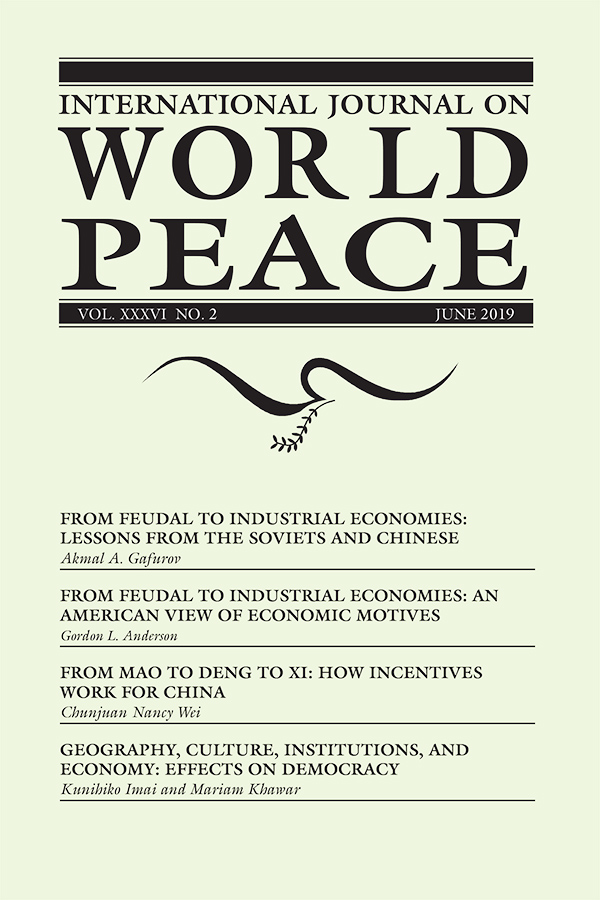Beyond Ideology: Measuring the Impact of Cultural Beliefs and Values on Political and Economic Development
Introduction to IJWP June 2019

The authors of the four articles in this issue are contributing to the scientific study of political economy. Many contemporary political and economic policies are guided by beliefs, suppositions, passions, and interests, rather than historical analyses and scientific measurements that correlate policies and desired outcomes. In this environment there is endless partisan argumentation, name-calling, and attempts to use political or military force to impose the will and the opinions of one group on others.
Our first three articles are about measuring the impacts of different incentives on political economy. We are in a position today to move beyond the simplistic assumptions of Marxism, Capitalism, and other ideologies that describe
Today we can study the lived experiences of the United States, the USSR, Communist China, Norway, Venezuela, Saudi Arabia, and many other countries that have had different types of political and economic systems. Aristotle’s great treatise
Our first three articles begin a discussion of comparative political economies based on four motives for production. These are:
- The administrative (A) motive, where people are told what to produce by a government or leader.
- The economic (E) motive, where people are given market incentives to produce for exchange or profit.
- The moral (M) motive, where people produce because they believe it is good and right to do so. And,
- The individual (I) motive, where people are driven by
survival instinct to find or create something to satisfy biological needs.
Our first article is by Professor Akmal Gafurov, who developed the tools for quantifying, measuring, and mathematically analyzing the three social motives (A, E, and M). In his essay, he examines the history of the Soviet Union from this perspective with some insights about economic development solely on A- and M- motives that would surprise Westerners. He shows how this analysis can explain why the Soviet Union collapsed, while China’s adoption of E-motives enabled their dramatic growth.
Our second article, by Dr. Gordon L. Anderson, provides a response to Gafurov’s article suggesting that A, E, and M motives are all social motives and that an individual motive I-motive,
In his rejoinder, Gafurov argues that this “taking” which is the opposite of producing, can be quantified with a minus (-)
Our third article, by Chunjuan Nancy Wei, uses Gafurov’s method to describe the evolution of the political economy of China from classical China through Mao and Deng to Xi Jinping. China’s Communist Party, which adopted the
While Wei does not raise the issue, there is a natural question this raises about the idea of China’s social credit score. Can, or should moral behavior (service to others vs. depending on others) be ranked by societies the way financial institutions rank
Our fourth article, by Professors Kunihiko Imai and Mariam
One of Imai’s conclusions strongly supports Gafurov’s analysis. This is the idea the culture (values) has a direct influence on economic development, while geography and the form of social institutions have only an indirect impact. It appears that ultimately a moral motive, which encourages people to voluntarily produce, is required to replace the administrative motive, that forces people to
Of particular interest to Imai and Khawar is whether Islam, as a set of cultural values inherited from the seventh-century a.d., is able to reconcile with democracy and economic development. Their results are inconclusive. Their analysis of many Islamic societies, which have a range of geographical conditions and institutional forms, neither confirms nor disconfirms any universal statements related to the compatibility of Islam with democracy or modern political economy.


To not have any statements about Islamicist compatibility with democracy, whether Imai or Khawar, or any editorial comments, is not only obscurantist, but irresponsible to the ideals of both Christianity and a Free Enterprise Republic.
The horrific destruction and genocide of Christians and other peoples of faith, in the name of a Caliphate, as well as the untold oppression of women and sexual exploitation of children and women (the child bride)and the practices of polygamy, are confirmation of the incompatibility of many forms of Islam with a democracy or modern political economy.
See the text, “A Battle for the Soul of Islam” by Dr.Zuhdi Jasser,
a foremost expert on Islam, who is leading a Reform Muslim
movement in America (American Islamic Forum for Democracy.) He
discusses the problems within aspects of Orthodox Islam and Sharia Law.
Since he is Muslim, born in Syria, his analysis is in-depth and
able to understand the tensions within the Muslim community about
their values and cultural traditions, as well as the political ideology.